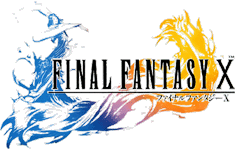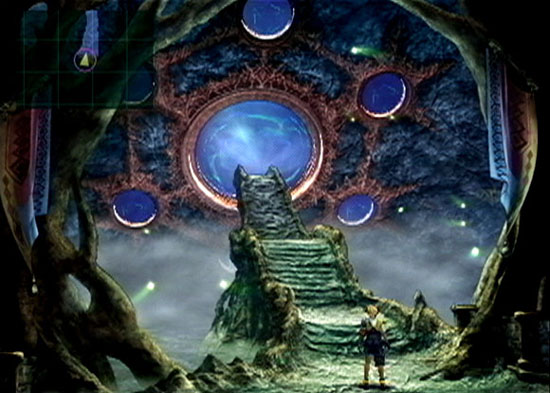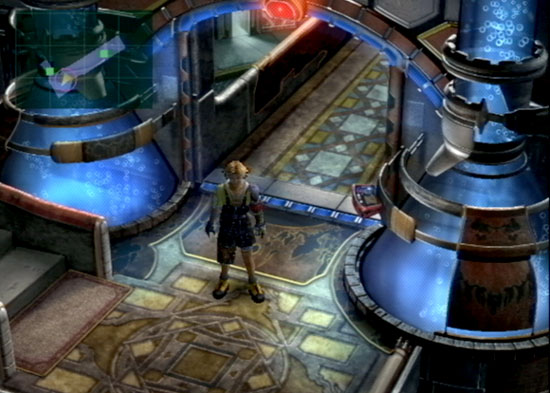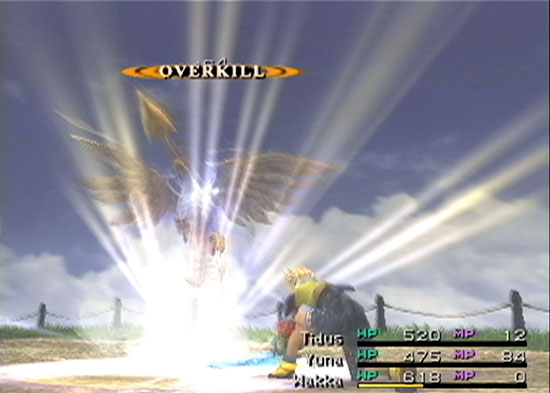|
|

|
BATTLE SYSTEM
|

|
INTERACTION
|

|
ORIGINALITY
|

|
STORY
|

|
MUSIC & SOUND
|

|
VISUALS
|

|
CHALLENGE
|
Easy to Medium
|
COMPLETION TIME
|
30-300 Hours
|
|
OVERALL
4.5/5
|
Rating definitions
|
|
|
Zanarkand is a massive city home to Tidus, star player of its most popular sport, Blitzball. As he plays a game one night, a mysterious beast known as Sin invades the city and sends Tidus to a land called Spira, where he joins the summoner Yuna and her guardians on a pilgrimage to defeat Sin, bring the Calm to the world, and find out what became of his city. Final Fantasy X, the first of Squaresoft's flagship series to appear on the Playstation 2, features significant changes from its predecessors, and is easily one of the defining RPGs for the system.
Final Fantasy X scraps the Active Time Battle System of its predecessors, and features combat more reminiscent of that in Final Fantasy Tactics, albeit without any field movement; all commands have a certain amount of recovery time after usage that affects the turn order of your party and enemies, with all commands executing immediately after the player inputs them, and a gauge showing when characters and enemies take their turns. Three characters fight at a time, and when players obtain more than this number, they can switch them in and out as desired.
All characters have something specific to offer to battle, and are effective against certain enemy types; for instance, Tidus can quickly dispatch nimble enemies with his sword, Wakka can attack flying enemies with his Blitzball, and Lulu's attack magic is good against slimes and blobs that normal attacks barely scratch. This adds a degree of strategy to combat largely absent from previous Final Fantasies; very rarely (in fact, almost never) will you be able to win battles simply by mashing the X button.
 Stargate makes a cameo
Stargate makes a cameo
|
|
Adding to combat are Yuna's Aeons, which she acquires sporadically throughout the game, and can summon into battle, replacing all characters on the field and fighting solo against the enemy. Aeons are generally powerful, although many bosses can instantly dispose of them; when Aeons die, the player's party returns to combat to fight normally. Players eventually gain the ability to customize the Aeons' abilities and stats by consuming items. Weapon and armor customization through item consumption eventually comes into play, as well.
Another feature is Overdrives, which players can use when a character's Overdrive gauge has filled by taking damage; players do eventually acquire additional means of filling Overdrive gauges, such as normally attacking (Aeons too have Overdrive gauges, filled when they deal or receive damage). Overdrives largely resemble Limit Breaks from previous Final Fantasies, are fairly powerful, and, of course, empty a character's Overdrive gauge.
After a battle, all characters that performed a command gain Ability Points, and once they've acquired enough, they gain a Sphere Level, which players can consume to move a character one space across the massive Sphere Grid. Special items are necessary to activate nodes on the Sphere Grid, allowing for the acquisition of increased stats and skills. There are also locks of four levels on the Grid which the player can remove with specific items, and ultimately allow players to traverse other characters' sections for endless customization possibilities.
The significant changes in combat were, in my opinion, certainly welcome after six consecutive installments of Active Time Battles, with the new combat system moving just as quickly while still offering strategy, although using all characters so that each gains experience can sometimes drag out fights, and the encounter rate is somewhat high. Still, the Sphere Grid system is perhaps one of the best character development systems I've ever seen in any RPG, a fresh break from normal leveling up in previous Final Fantasies, and overall, combat is one of the main draws to the game.
 "Hmm, maybe drinking that shrinking potion was a huge mistake..."
"Hmm, maybe drinking that shrinking potion was a huge mistake..."
|
|
Moving on, Final Fantasy X's interface is spotless for the most part, with easily navigable menus, stackable items, and easy shopping for items and equipment. Granted, save points can be far apart at times, although they fully heal your party and Yuna's Aeons; a scene skip option would've been nice, as well. Moreover, there is no overworld of which to speak, accounting for more realistic world exploration, with little backtracking necessary (an airship ultimately provides rapid conveyance among visited areas), and an indicator on the mini-map pointing players in the right direction.
Though some have chastised Final Fantasy X for being linear, there are a number of sidequests and minigames that can easily keep completionists occupied up to around three hundred or so hours, with a straightforward playthrough taking as little as thirty hours. Unfortunately, many of the minigames, except maybe Blitzball (in my opinion probably the best Final Fantasy minigame since Final Fantasy VIII's Triple Triad), are unplayable nightmares; however, that completing them can possibly shatter the balance of the game somewhat justifies their difficulty, and playing them, thankfully, is hardly necessary to beating the game, although some of the last few bosses can be slightly tricky without extensive sidequesting and leveling.
One sidequest that deserves mention is the collection of Al Bhed Dictionaries, which translate the Al Bhed language many denizens of Spira speak. Al Bhed Compilation Spheres allow players to import Dictionaries collected in other saved games, and since these Spheres are available early on, Final Fantasy X is replayable at least once for those who wish to fully understand the Al Bhed dialogue, with the sidequests and endless possibilities of character customization augmenting replay value.
Those expecting Final Fantasy X to play like its predecessors will certainly be in for surprise, disappointment, even. The vast majority of the title's changes, chiefly in gameplay, are unlike anything ever seen in the series or genre. It does retain a few elements from its predecessors, such as spell names, an airship, chocobos, a few summons, a character named Cid, and the like, although the tenth Final Fantasy stands out even today as a unique experience.
 "That's the last time you ever crap on my car!"
"That's the last time you ever crap on my car!"
|
|
Final Fantasy X's story is perhaps the deepest of the series, with many nice twists and reasonably developed characters. Some may not appreciate Tidus's upbeat personality, although I'm certain many of us know someone like him ^_^ Even so, the plot is perhaps the biggest draw to the game, and one of the finest in the series and the current generation of RPGs.
Final Fantasy X's musical presentation, though, could've used some improvement. This isn't to say the music is bad, since much of it is pretty good, beautiful, even. Many of the weaker pieces, though, at times tend to show up fairly often, although there are a few central themes that decently glue the soundtrack together. The tenth installment is also the first to feature voice acting, which is well above average (the speakers of the Al Bhed language in particular are very convincing), though a few characters, mainly Tidus and Yuna, have a tendency to pause where there's no punctuation in the dialogue, and can sound stilted or too upbeat at times. Still, a decent-sounding game.
Final Fantasy X also makes the visual leap to three dimensions (although there are many still pre-rendered environments, which nonetheless look gorgeous), with realistic character models and scenery containing decent coloring, as well as FMVs that are a treat for the eyes. There are some minor imperfections, though, with scenery textures and NPCs seeming slightly rushed when the camera closes in on them during cutscenes, although the game's visuals hold up nicely even today.
Though it lacks the feel of previous installments of the series, Final Fantasy X is nonetheless a solid RPG in its own right and one of the first great RPGs for the Playstation 2, with just about all its aspects being solid. It certainly won't appeal to those expecting it to play like previous Final Fantasies, although frankly, until you've played Final Fantasy X, then you really haven't played Playstation 2 RPGs.
Review Archives
|









